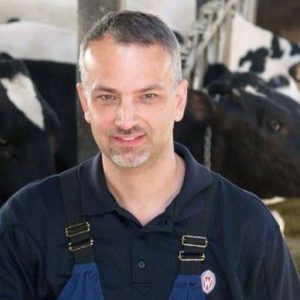Nigel Cook – “Giving Cows the Spa Treatment: How do we Balance Animal Welfare with Economic Realities on the Dairy?”
November 7th, 7pm, 1111 Genetics/Biotechnology Center, 425 Henry Mall

Nigel Cook is a Professor in Food Animal Production Medicine and Chair of the Department of Medical Sciences in the School of Veterinary Medicine at UW-Madison. He is also head of the Dairyland Initiative, a UW program that assists farmers in keeping dairy cows happy and maximizing milk production through barn design and herd management
Last night we heard Nigel Cook talk about his experience in the field of veterinary science and his involvement at the UW Vet School and in the Dairyland Initiative. The model he based his talk off of was “Education -> Research -> Outreach -> Partnerships -> Impact”. Beginning with education, Dr. Cook shared that UW’s veterinary school has unrivaled hands-on learning for dairy-interested veterinary students. He then went on to show examples of the partnerships established among community farms and the University, a particular example being the Dairyland Hoofcare Institute. From what I gathered, it seems like these partnerships are desirable to students all over the country, and now veterinary students from around the United States are able to come to UW to learn about veterinary science in our facilities. This is funded by the USDA and allows other students to learn about the uniqueness of Wisconsin’s dairy industry and the University.
Dr. Cook shared a bit about his research related to lameness [I will admit I was very unsure about the definition of lameness for a portion of the talk], or the deviations in gait in cows. He showed examples of the impact that different bedding, stalls, and ventilation can have on cows’ health and their production of milk. An example of his impact in this area was learning that by widening stalls, lameness decreased and rest time increased, allowing for optimal milk production. He also created foot baths for cattle which has been advertised and shared through social media as a “spa treatment”. I really enjoyed this portion of his talk because while some of the graphics seemed intimidating at first sight, Dr. Cook did a great job of breaking them down into smaller parts. His embedded videos supported the topics he touched upon nicely and were a unique part of his presentation that we haven’t seen prior.
While there were many more examples of research and Dr. Cook’s impact on the dairy industry shared in his talk, I think it is most important to focus on the “Outreach” and “Impact” portions of his talk. My favorite quote of the night was, “Research is useless unless you tell a farmer about it.” Dr. Cook and other members of the UW Veterinary School meet individually with farmers for consultations, but found that it was time-consuming and nearly impossible to meet with all farmers from different parts of the Midwest. Because of this, Dr. Cook and others created “Dairyland Initiative”, an online guide related to cow housing and lameness prevention, among other things. This online guide is now translated in French and Spanish, evidence to the amount of countries this guide is servicing. There are also Dairyland Initiative Workshops, which have allowed over 730 farmers from across the world to become more informed about research-based cow practices. This group has raised over $1 million.
I deciphered Dr. Cook’s definition of the Wisconsin Idea through the structuring of his presentation. I believe all five portions of his talk contribute to his definition of the Wisconsin Idea, although he seemed to stress research and outreach the most, in my opinion. One question that arose for me during his talk was related to the USDA grant that allows outside students to attend UW-Madison. I wonder, are veterinary students from across the country drawn to the veterinary program here at UW because of its prestige, or because of all of the partnerships our program has? Could we be as prestigious without those partnerships?